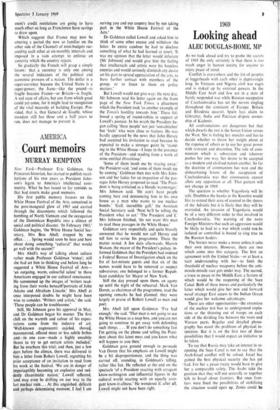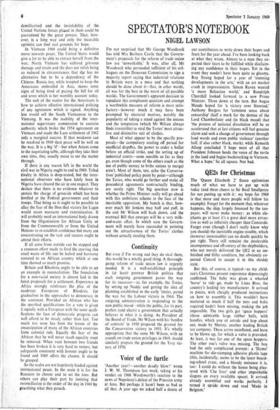Looking ahead
1969 ALEC DOUGLAS-HOME, MP
As we look ahead and try to probe the secrets of 1969 the only certainty is that there is too much anger in human society for anyone to enjoy peace of mind.
Conflict is everywhere and the list of peoples at loggerheads with each other is depressingly long. In Vietnam and Nigeria civil war rages and is stoked up by external powers. In the Middle East Arab and Jew are in a state of barely suspended war while Russian occupation of Czechoslovakia has set the nerves tingling throughout the continent of Europe. Britain and Rhodesia quarrel, Spain lays claim to Gibraltar, India and Pakistan dispute owner- ship of Kishmir.
All confrontations are dangerous but that which dwarfs the rest is the Soviet Union versus the West. She is feeling her muscles and has to decide whether to throw her weight about at the expense of others or to use her great power with restraint and discretion. The role of com- munism which is subversion and takeover pushes her one way, her desire to be accepted as a modern and civilised nation another. So far the doctrine of communism has won and the disheartening lesson of the occupation of Czechoslovakia was that communists cannot allow any opposition at all. That pattern will not change in 1969.
The question is whether Yugoslavia will be safe. Doubtless the hawks in the Kremlin would like to extend their area of control to the shores of the Adriatic but it is likely that they will be overruled. An invasion cif Yugoslavia would be of a very different order to that involved in Czechoslovakia. The warning of the NATO Foreign Ministers that such an aggression would be likely to lead to a war which could not..be isolated or controlled is bound to ring true to the Russian leaders.
The Soviets never make a move unless it suits their own interests. However, there are two which come into this category. The first an agreement with the United States—or at least a tacit understanding with her—to limit the threshold of nuclear weaponry before the anti- missile-missile race gets under way. The second, a truce or peace in the Middle East, a feature of which would be the reopening of the Suez Canal. Both of these moves and particularly the latter which would give her new and forward naval strategy East access to the Indian Ocean would give her welcome advantages.
There are other opportunities—the extension of the nuclear test ban to underground explo- sions or the thinning out of troops on each side of the dividing line between the NATO and Warsaw pacts. Regular and detailed photo- graphy has eased the problems of physical in- spection. But it is on the first two of these possibilities that I would expect an initiative to be taken.
To say that Russia may take an interest in re- opening the Suez Canal is not to say that the Arab-Israel conflict will be solved. Israel has gained the best physical security she has yet had. For her a peace treaty would have to give her a comparable safety. The Arabs take the position that they will not severally or together 'talk to Israel about frontiers. But once fron- tiers were fixed the possibilities of stabilising the situation would open up. Zones could -be demilitarised and the inviolability of the United Nations forces placed in them could be guaranteed by the great powers. That, how- ever, is a long way and only the incurable optimist can find real grounds for hope.
In Vietnam 1969 could bring a definitive move towards peace. The United States would give a lot to be able to extract herself from the war; North Vietnam has suffered grievous damage and strain and she does not relish being so reduced in circumstances that she has no alternative but to be a dependency of the Chinese. Russia too, while tempted to keep the Americans embroiled in Asia, shows some signs of being tired of paying the bill for oil and arms which is her monthly account today.
The nub of the matter for the Americans is how to achieve effective international policing of any agreement which is signed. Anything less would sell the South Vietnamese to the Vietcong. It was the inability of the inter- national supervisory commission to exercise authority which broke the 1954 agreement on Vietnam and made the Laos settlement of 1962 only a marginal success. If that weakness can be resolved in 1969 then peace will be well on the way. It is a big 'if'—but when Asians come to the negotiating table, although they take their own time, they usually mean to see the matter through.
If there is any reason left in the world the civil war in Nigeria ought to end in 1969. Tribal rivalry in Africa is deep-seated, but the inter- national observers who have lately been in Nigeria have cleared the air in one respect. They declare that there is no evidence whatever to sustain the charge of genocide which has been levelled at the Federal government and their troops. That being so it ought to be possible to allay the fear of the Ibos that victory for Lagos would mean massacre and extermination. It will probably need an international body drawn from the Organisation for African Unity or from the Commonwealth or from the United Nations to re-establish confidence but many are concentrating on the task and success ought to attend their efforts.
If all arms from outside can be stopped and a common effort made to feed the starving this cruel waste of life can be halted and harmony restored to an African country which at one time showed so much promise.
Britain and Rhodesia ought to be able to set an example in reconciliation. The foundation for a non-racial society is almost laid in the latest proposals for a settlement. Experience in Africa strongly reinforces the plea of the moderate Europeans of Rhodesia for gradualism in the approaches to democracy in the continent. Provided an African who has the specified qualifications for a vote is given it equally with a European with the same quali- fications the face of democratic progress can well afford to be steady rather than fast. Too much too soon has been the lesson of the emancipation of many of the African countries from colonial rule. Equally the fear of the African that he will never reach equality must be removed. When trust between two friends has been broken it is very hard to restore, but safeguards consistent with honour ought to be found and 1969 offers the chance. It should be grasped.
So the scales are not hopelessly loaded against international peace. In the main it is for the Russians to choose and to set the tone. But others can play their part by insisting that reconciliation is the order of the day in 1969 by practising what they preach.



































 Previous page
Previous page